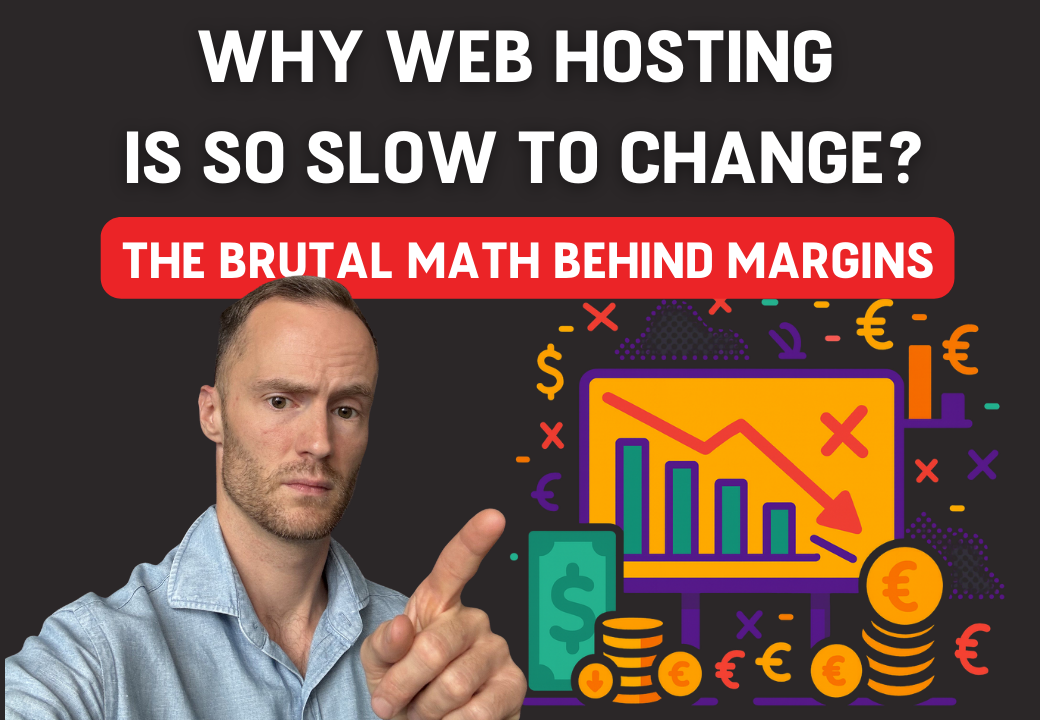We often talk with solution/software providers that want to bring new products or services to web hosting companies. They are quickly surprised when they hit a wall as hosters do not want to “add a security for just $1/site” or “introduce a new upselling opportunity to make them millions” and it is not clear to them why web hosting providers are so slow to change?
I must admit, I’ve been offering software products to hosting providers for 15+ years and it has been (and still is) confusing.
The reason is simple though: Not understanding the reality of a web hosting provider 🙃
Let me break it down for you. This is what I’ve learned very recently, really just since starting webhosting.today and the podcast.
The price paradox
Web hosting industry, even in the “post-unlimited-accounts” era is still extremely price-sensitive. As a matter of fact, except rich markets like US or Western Europe, almost everything is about the price. If we’re talking about large scale, very little customers are mature enough to realize that paying more makes sense.
I call it the price paradox:
- If the customer has to pay extra for “security” or “performance” they complain: “why is this not standard” and usually do not buy it
- If you increase the hosting plan by just $1 dollar per month, big part of these customers immediately start looking for another provider
- If their site gets hacked or works slowly they blame the hosting provider anyway
So in short: they do not want to pay for it, they do not want to see the price go up, but they still expect everything to work perfect.

That brings the question: Providers such as WPEngine or Rocket.net offer premium and succeed. Why not apply that to other providers?
The premium trap
Going premium in web hosting sounds easy in theory but in reality it is one of the hardest things a provider can do. Building a good product with strong features is NOT enough. The key is to build a brand that people actually trust and to run marketing that convinces customers to pay more for something they cannot immediately see or touch. Most hosting companies are not prepared for this kind of challenge, and many who try end up failing.
The financial side makes it even worse. Many solutions for hosting are billed per site or per user. On paper this makes sense but when you run hundreds of thousands of sites the math becomes brutal. Adding one tool could easily consume more than half of your revenue from hosting. At that point the numbers no longer work and the idea of being a premium host turns into a huge risk.
This is why so many providers stay in the safe zone. They sell cheap shared hosting because that is what the majority of the market still wants. They avoid big changes because moving into premium means changing not only the product but the entire way they run their business.

Most customers don’t see the benefits of premium hosting. They usually realize the value only after some time and after some pain.
Why some succeed?
There are of course exceptions to this cycle, and they prove the rule rather than break it. Companies like WP Engine or Rocket net grew because they focused on a different type of customer, the one who already learned the hard way that cheap hosting comes with problems. These customers may have lost a site to hacks or wasted time fixing downtime, and after that they are ready to pay more for peace of mind. For them the decision is no longer about price but about trust and the promise that their business will stay online without constant stress.
Once a provider wins such customers, it can build a brand around reliability and quality. Over time the brand itself becomes the guarantee, and that is when premium hosting really works. We saw a similar story with DigitalOcean, which started with simple servers but later became trusted by developers and grew into something bigger, with Vultr and others following. The key is to move from competing on price to competing on reputation, but reaching that stage is rare and takes scale, patience, and skill.
Advice for solution providers (and myself I guess)
With every solution I create, I get better at this (talking with hosts or having a podcasts definitely helps!). For example, with Konrado.AI we aim for pure value-based pricing. Saving costs on your suport team or making more customers happy by making it more effective? We can charge you based on that.
With adminbolt we show a simple calculation: your costs with the old control panel vs. the lower costs with a modern solution. The extra revenue stream from upselling via the marketplace is just the cherry on top and not even in the main three reasons to buy it.
It is much easier to talk about price for our product when you provide measurable value.
If you want to sell to hosting companies, do not pitch with “it is just $1 per site” because that ignores their reality. Show them how your solution can either make them money (new revenue stream they can EASILY upsell) or save them money (lower churn, fewer support tickets, less downtime). The math must be clear and work at scale, otherwise they will see it as a direct hit to their already thin margins.
Understand also that most hosts cannot flip overnight into premium. If your solution needs premium pricing to make sense, target the few providers who already built a brand around quality. For everyone else, the only way in is to show real cost savings, automation, or efficiency that does not force them to raise prices.
Konrad Keck
Web hosting enthusiast, connecting technical expertise with business strategies. Revolutionizing the industry with automated, user-focused solutions since 2011. Founder of various innovative solutions including ModulesGarden, PanelAlpha, MetricsCube, and EasyDCIM.
